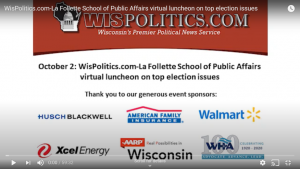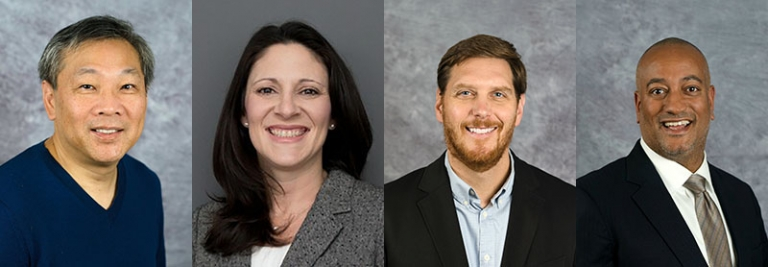A Panel presented by UW–Madison’s La Follette School of Public Affairs and WisPolitics.com (October 2), video here.
Friday, October 2, noon to 1 p.m.
UW–Madison’s La Follette School of Public Affairs and WisPolitics.com present this noon-hour discussion on crucial policy issues leading up to this fall’s election.
Swing State Wisconsin: The Major Issues for Voters this November features a panel discussion with four La Follette School faculty members, who also will answer audience questions.
During this livestreamed event, these nationally renowned experts will offer evidence-based insights on society’s pressing problems, including health, climate, and economic policy as well as racial justice issues.
Panelists
Menzie Chinn is a professor of public affairs and economics. His research examines the empirical and policy aspects of macroeconomic interactions between countries. He has been a visiting scholar at the International Monetary Fund, the Congressional Budget Office, the Federal Reserve Board, the European Central Bank, and the Banque de France.
Christine Durrance is an associate professor of public affairs. She is an applied microeconomist concentrating in health economics and policy. Her work includes a focus on maternal, infant, and reproductive health; risky behavior (e.g., substance use and violence); and the legal and policy environment.
Greg Nemet is a professor of public affairs. He focuses on understanding the process of technological change and the ways in which public policy can affect it. His first book, How Solar Became Cheap: A Model for Low-Carbon Innovation, was published in June 2019 by Routledge. In the book, he makes the case that by understanding the drivers behind solar energy’s success, other low-carbon technologies with similar properties can benefit.
Geoffrey Wallace is an associate professor of public affairs and economics. His research is in labor economics, the economics of marriage and the family, and policy issues relating to poverty. He is the La Follette School’s first Kohl Chair in Undergraduate Education and an affiliate of UW–Madison’s Institute for Research on Poverty.
Moderator: Jeff Mayers — president, Wispolitics.com


Was gonna watch this live and dropped the ball. So I appreciate the YT upload and link here. I did input a question on solar, so I’m hopeful it was touched on, though with only an hour of time and tuition paying students having their own questions I certainly won’t be offended if it didn’t.
Hope everyone is staying safe out there. Remember if you have older relatives or older friends you have to be so conscientious around them and allow for spacing. If you get near them to give them food or hugs or something make sure you just washed the hands and both of you are wearing a mask.
Nicely done Menzie at the LaFollet today.
The big problem, as you observed, is how to get low information citizens to hear what experts are saying. How to overcome the reluctance of the many to listen up?
Most fields have this problem and popularizers are disdained by both the elite (JK Galbraith).
Economic illiteracy,innumeracy, all are walls to understanding.
Help!
Krugman has been beneficial and a leader on this front. Some of my biggest leaps in understand economics was reading Krugman in my late teens before I ever took undergrad micro. I had a great prof also who went to Chicago for his PhD, had a theological degree from Harvard, was crew member for an AWACS plane in the Air Force and had 4 degrees from 4 different respected institutions, but went to the umpteenth degree to let students feel confident and pass without giving them a freebie.
I was exceedingly lucky in the teaching I had at a small state university—and I lucked out because I was an incredibly crappy high school student who was good at taking tests and got in on my ACT score alone (which I got a score way above the national average). I didn’t have to take the PSAT to get into the university I went to, but had some grade A profs. The PSAT might have got me excluded had it been required at that school, I don’t know, but as everyone knows it’s way tougher than the ACT.
What I’m saying is there should be efforts made to reach out to those in those lower educated groups and lower income groups. It’s really tough when you don’t have parents facilitating you education-wise and environment-wise (your neighborhood etc) and then put up against other kids that have the advantages. And that’s not just minorities either, it’s also including white trash getting into the uprising boat.
Moses,
I thank you for this frank and informative explanation of your past. We have have a history of fighting here, much to the annoyance of many, and I have several hours ago put a critical comment up here on one of your comments. But that was before I read this.
Anyway, while I suspect we shall be giving one another hard times at times in the future, I want to say right now the world is approaching a critically climatic point. Neither of us forecast this situation, although it occurred to me on many occasions that the personal carelessness of the POTUS might well lead to him becoming ill with the SARS-Cov2.
So for me this puts me into a view that we are now facing a world historical juncture in the near future. I think the intellectual differences between us are now of little importance in the face of what we are facing. As of now I am not interested in silly personalistic fights and would like to focus on us helping to get all of us through this difficult time to an at least democratic and hopeful future, even if when we get there we disagree and debate details of what should proceed.
I would even like to put aside our personalistic feuds, which I think most here find simply annoying and space wasting. I have a few times in the past proposed this, to no avail. But maybe now with you being more open about your own past, and the seriousness of what we are now going through as a world community, maybe we can move on to a better future.
I get no thrill out of arguing with people. In fact if you knew the lengths I go to to avoid interpersonal conflict, I’m sure you’d be stupefied and nearly blackout.
Congrats to you, Menzie, and your colleagues at the LaFollette Institute. Well done.
We are now in an extraordinary situation. Wisconsin is indeed one of the most crucial swing states of them all. I think we may have seen an ultimate sign in the refusal of the city and county of LaCrosse to have President Trump have a rally there, given the red hot spot category of that location regarding SARS-Cov2. Prior to his being recognized as ill with the virus, the president accepted this judgment and planned to move his rally to Janesville, while still planning to go to Green Bay as well, despite opposition from local authorities there as well. But, of course, both of these rallies have now been cancelled, given the president’s unfortunate health situation.
I note that on Econospeak as more than one post and a few comments here I have argued that the swing part of Wisconsin is its southwestern part, arguing that “He who takes Prairie du Chien Takes the White House.” Well, LaCrosse is not very far north of Prairie du Chien, so I think that swing part of the state will be going for Biden, who will get the White House.
Again, congrats, Menzie, to you and your colleagues for a well-informed and articulate discussion of the main issues in this election for Wisconsin.